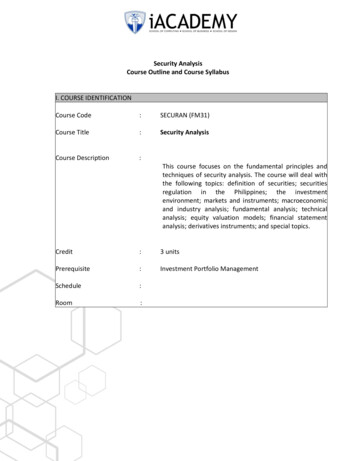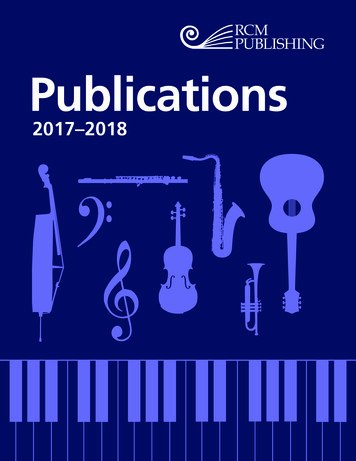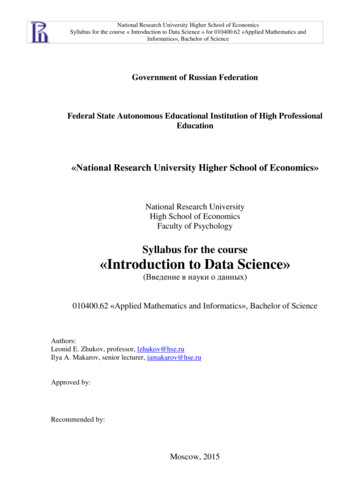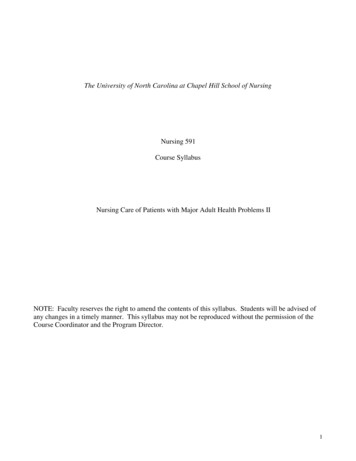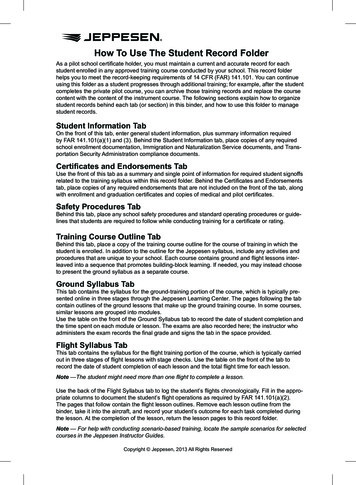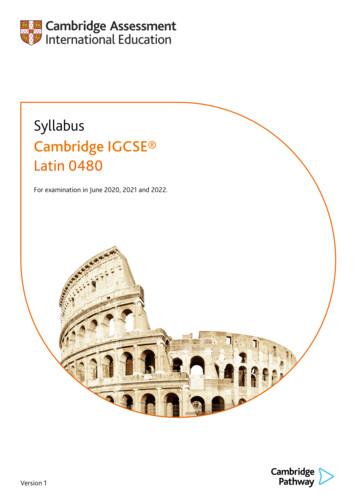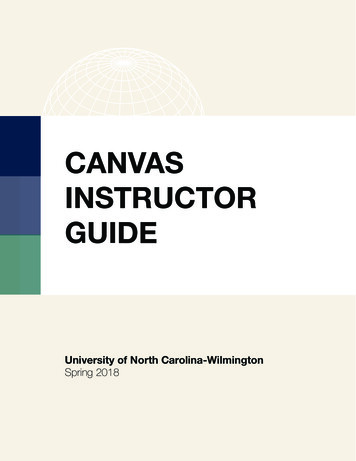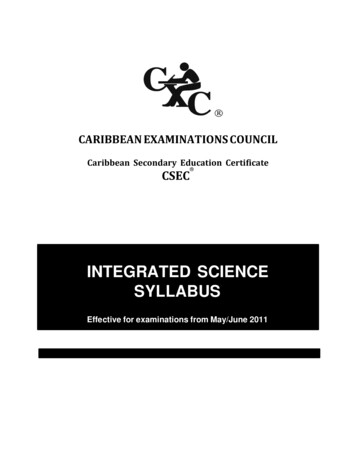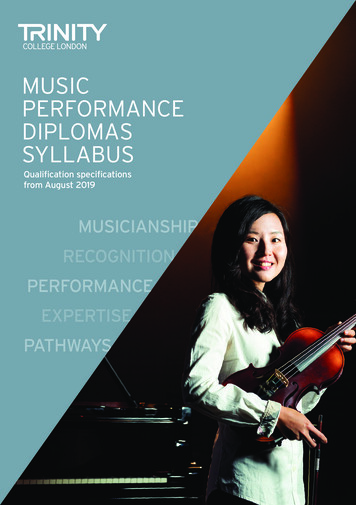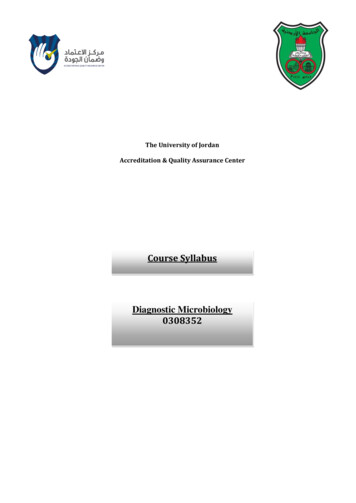
Transcription
The University of JordanAccreditation & Quality Assurance CenterCourse SyllabusDiagnostic Microbiology0308352
The University of JordanCourse SyllabusAccreditation and Quality Assurance CenterDiagnostic Microbiology1Course title2Course number3Credit hours (theory, practical)Contact hours (theory, practical)4Prerequisites/corequisites2 hours theory, 1 hour practical2 hours theory per week and 3 contact hours practicalGeneral Microbiology5Program titleBSc in Clinical Laboratory Sciences6Program codeNA7Awarding institutionThe University of Jordan8FacultyScience9DepartmentClinical laboratory Sciences10Level of courseBachelor11Year of study and semester (s)Third year, First semester12Final QualificationOther department (s) involved inteaching the courseClinical laboratory technologist14Language of InstructionEnglish15Date of production/revisionJuly 2018130308352NA16. Course Coordinator:Office numbers: B 029office hours: 1-2 Dailyphone numbers: 22238email addresses : s. mattar @ju.edu.jo17. Other instructors:Office numbers, office hours, phone numbers, and email addresses should be listed.NONE18. Course Description:This is a diagnostic microbiology course intended for students studying at the department of ClinicalLaboratory Sciences.The course (Lectures and laboratory sessions) will concentrate on the detection and identification ofinfectious agents in the clinical laboratory, followed by determination of susceptibility to antimicrobialagents. The course will cover general principles of infectious diseases and laboratory diagnosis. Thelargest section will consists of extensive discussion of groups of infectious agents (bacterial) and thediseases that they produce.1
The University of JordanCourse SyllabusAccreditation and Quality Assurance Center19. Course aims and outcomes:A- Aims:This is a diagnostic microbiology course intended for students studying at the department of ClinicalLaboratory Sciences.The course (Lectures and laboratory sessions) will concentrate on the detection and identification ofinfectious agents in the clinical laboratory, followed by determination of susceptibility to antimicrobialagents. The course will cover general principles of infectious diseases and laboratory diagnosis. Thelargest section will consists of extensive discussion of groups of infectious agents (bacterial) and thediseases that they produce.B- Intended Learning Outcomes (ILOs): Upon successful completion of this course students will beable to 1. Define basic principles of medical microbiology.2. Apply theory, microbiology knowledge and technical skills to identify bacteria in the laboratory,appreciating the hazards associated with handling microorganisms in the laboratory and the subsequentsafety requirements3. Identify the etiology, epidemiology and laboratory diagnosis of different diseases.4. Asses appropriate methods for isolation and identification of infectious agents.5. Select and asses appropriate methods of infection control to prevent infections.6. Operate different laboratory procedures in analysis of biological samples.7. Monitor and control microbial growth and carry out laboratory tests to identify infectious diseases.8. Control sterilization processes and aseptic procedures.9. Devise a dichotomous key to aid in the identification of disease-causing bacteria in the lab, andaccurately identify disease-causing bacteria by using the key and experimental techniques.10. Critically analyse the results of clinical investigations;11. Perform laboratory tests to investigate anti-microbial agents;12. Communicate using the proper scientific language of the field including clinical laboratory reportswritten with a professional approach.13. Work collaboratively and evaluate team work in small groups.2
The University of JordanCourse SyllabusAccreditation and Quality Assurance Center20. Topic Outline and Schedule:TopicMicrobes and theScience ofMicrobiologyWeek1Dr. ved ILOsUnderstandingInfectious Diseases1Dr. SuzanMatar1,2,3ExamsCombating Pathogensand InfectiousDiseases2Dr. SuzanMatar5ExamsClinical SpecimensUsed for the Diagnosisof Infectious Diseases3Dr. SuzanMatar2,3,4,5,6,7,8,10,12ExamsAntimicrobial Agents5Dr. SuzanMatar4,5,6,11Exams3ReferenceCHAPTER 1Laboratorydiagnosis ofinfectious diseasesEssentials ofdiagnosticmicrobiology /Paul G. Engelkirk,Janet DubenEngelkirk.CHAPTER 2Laboratorydiagnosis ofinfectious diseasesEssentials ofdiagnosticmicrobiology /Paul G. Engelkirk,Janet DubenEngelkirk.CHAPTER 3Laboratorydiagnosis ofinfectious diseasesEssentials ofdiagnosticmicrobiology /Paul G. Engelkirk,Janet DubenEngelkirk.CHAPTER 5Laboratorydiagnosis ofinfectious diseasesEssentials ofdiagnosticmicrobiology /Paul G. Engelkirk,Janet DubenEngelkirk.CHAPTER 7Laboratorydiagnosis ofinfectious diseasesEssentials ofdiagnosticmicrobiology /Paul G. Engelkirk,
The University of JordanCourse SyllabusAccreditation and Quality Assurance CenterLaboratory methodsand strategies insusceptibility testing(Bailey’s)6Dr. SuzanMatar4,5,6,10,11,12ExamsGeneral ClinicalMicrobiologyLaboratory Methods7Dr. SuzanMatar6,7,8,10,11,12ExamsGram-Positive Cocci8Gram-Positive andAcid-Fast Bacilli9Dr. SuzanMatar1,2,3,7ExamsGram-Negative Cocciand Related Bacteria10Dr. SuzanMatar1,2,3,7Exams4Dr. SuzanMatar1,2,3,7ExamsJanet DubenEngelkirk.Chapter 12:Tille, P. M., &Forbes, B. A.(2014). Bailey &Scott's diagnosticmicrobiology (Thirteenth edition.).St. Louis, Missouri:Elsevier.CHAPTER 6Laboratorydiagnosis ofinfectious diseasesEssentials ofdiagnosticmicrobiology /Paul G. Engelkirk,Janet DubenEngelkirk.CHAPTER 9Laboratorydiagnosis ofinfectious diseasesEssentials ofdiagnosticmicrobiology /Paul G. Engelkirk,Janet DubenEngelkirk.CHAPTER 10Laboratorydiagnosis ofinfectious diseasesEssentials ofdiagnosticmicrobiology /Paul G. Engelkirk,Janet DubenEngelkirk.CHAPTER 11Laboratorydiagnosis ofinfectious diseasesEssentials ofdiagnosticmicrobiology /Paul G. Engelkirk,Janet DubenEngelkirk.
The University of JordanCourse SyllabusAccreditation and Quality Assurance CenterGram-Negative Bacilli:The FamilyEnterobacteriaceae11Dr. SuzanMatar1,2,3,7ExamsGram-Negative Bacilli:Nonfermenters12Dr. SuzanMatar1,2,3,7ExamsFastidious andMiscellaneous GramNegative Bacilli12Dr. SuzanMatar1,2,3,7ExamsCurved and SpiralShaped Bacilli13Dr. SuzanMatar1,2,3,7ExamsObligate IntracellularBacteria14Dr. SuzanMatar1,2,3,7ExamsAnaerobic Bacteria14Dr. SuzanMatar1,2,3,7Exams5CHAPTER 12Laboratorydiagnosis ofinfectious diseasesEssentials ofdiagnosticmicrobiology /Paul G. Engelkirk,Janet DubenEngelkirk.CHAPTER 13Laboratorydiagnosis ofinfectious diseasesEssentials ofdiagnosticmicrobiology /Paul G. Engelkirk,Janet DubenEngelkirk.CHAPTER 14Laboratorydiagnosis ofinfectious diseasesEssentials ofdiagnosticmicrobiology /Paul G. Engelkirk,Janet DubenEngelkirk.CHAPTER 15Laboratorydiagnosis ofinfectious diseasesEssentials ofdiagnosticmicrobiology /Paul G. Engelkirk,Janet DubenEngelkirk.CHAPTER 16Laboratorydiagnosis ofinfectious diseasesEssentials ofdiagnosticmicrobiology /Paul G. Engelkirk,Janet DubenEngelkirk.CHAPTER 17Laboratorydiagnosis of
The University of JordanCourse SyllabusAccreditation and Quality Assurance Centerinfectious diseasesEssentials ofdiagnosticmicrobiology /Paul G. Engelkirk,Janet DubenEngelkirk.21. Teaching Methods and Assignments:Development of ILOs is promoted through the following teaching and learning methods:1. Power point lectures2. Videos3. Audios4. Journal articles5. Clinical Cases6. CDC discussing reports7. elearning (Moodle)8. Facebook (Special page for the topics)22. Evaluation Methods and Course Requirements:Opportunities to demonstrate achievement of the ILOs are provided through the followingassessment methods and requirements:1. Midterm Exam2. Final Exam3. Practical Exam23. Course Policies:A- Attendance policies:Lectures are mandatory for students registered for the course. In general, lecturers can assign a Fail (F)grade for any student with five or more absences from class. Upon a written request from the student,the lecturer may exceptionally grant temporary exemption from attending a specific lecture. Failure tocomply with the course attendance policy may imply consequences for the student’s final grade asannounced in the course syllabus.B- Absences from exams and handing in assignments on time:It is expect students to make every effort to take required exams as scheduled. If the student knows inadvance that he/she will miss such a requirement, they should notify me. If the student is ill or othercircumstances cause him/her to miss a required graded activity, they should notify me as soon aspossible. The student must present a letter from an authority (e.g., physician) documenting the reason.Make up exam should be scheduled based on the appropriate circumstances for the lecturer and thestudent. Students who miss a scheduled make-up will leave the lecturer with little choice but to give thestudent an “F” on that exam.6
The University of JordanCourse SyllabusAccreditation and Quality Assurance CenterC- Health and safety procedures:The classrooms are equipped with the appropriate flooring, electrical, heating and cooling systems.In the practical sessions:- Wash hands frequently.- Avoid hazardous activities.- No drinking and eating- Instruct students in safety issues, such as safe use of equipment prior to commencing each activity.- Ensure appropriate use is made of all safeguards, safety devices and personal protective equipment.- Reporting for violent incidents and threatsD- Honesty policy regarding cheating, plagiarism, misbehaviorAny of the above mentioned behaviors should be reported to the deanship office through the head of thedepartment.E- Grading policy:THEORY 80 % (Midterm Exam 30%, Final Exam 40%)LAB 30 % (Final Exam 30%)F- Available university services that support achievement in the course:Data show devices, Computer labs and library.24. Required equipment:Data show, audio system.25. References:A- Required book (s), assigned reading and audio-visuals:1. Laboratory diagnosis of infectious diseases : essentials of diagnostic microbiology / PaulG. Engelkirk, Janet Duben-Engelkirk.2. Tille, P. M., & Forbes, B. A. (2014). Bailey & Scott's diagnostic microbiology (Thirteenthedition.). St. Louis, Missouri: Elsevier.B- Recommended books, materials, and media:1. Jawetz, Melnick, & Adelberg’s Medical Microbiology, 25th Edition, By Geo. F. Brooks, Karen C.Carroll, Janet S. Butel, Stephen A. Morse.7
The University of JordanCourse SyllabusAccreditation and Quality Assurance Center2. A CLASSROOM FACEBOOK PAGE: Medical Microbiology and 60391789023/?ref bookmarks3. Access UJ E-learning portal for the course power point lectures and other supplements.26. Additional information:The practical sessions:WeekTopicDescription1Introduction to Diagnostic Bacteriology- Laboratory Safety Procedures- Specimen-Sampling Collection- Culture Media Preparation Sterilization2Aseptic Technique Transfer OfMicroorganisms-Aseptic TechniqueThe Streak-Plate TechniqueForms of Culture MediumColony Morphology and PigmentationGram and Acid Fast Stain-Staphylococcus aureus,S. epidermidisS. saprophyticusBeta Streptococci (Groups A,B,C,F,G)Pneumococcus (Streptococcus pneumoniae)Viridans StreptococciEnterococciBacillus CorynebacteriaeStaining3.Identification of Gram Positive Cocci (1)4.Identification of Gram Positive Cocci (2)5.Aerobic Anaerobic Endospore-FormingBacteriaIsolation Of Normal Microbiota FromHuman BodyIdentification Of Gram-Negative Cocci AndCoccobacilliIdentification of Enterobacteriaceae GramNegative bacilliIdentification of Pseudomonas andAcinetobacter Gram-Negative bacilliIsolation Of Normal Microbiota FromHuman Body6.7.8.9.A. Urine CultureB. Stool Culture10.Using Antimicrobial ChemotherapeuticAgents To Control Microorganisms8- Common microbiota of the nose and throat- Neisseriae- Hemophilus- Fermentative, Enteric Bacilli- Non-fermentative, Gram-Negative Bacilli- Common microbiota of Urine and Stool- Qualitative Urine Culture- Screening for Salmonella carriers- Antibiotic Susceptibility TestingKirby-Bauer Assay (Disk Diffusion)Tube Dilution (MIC) & (MBC)
The University of Jordan11.Course SyllabusSerological and Biochemical Identificationof MicroorganismsAccreditation and Quality Assurance Center-API Staph for Identification of clinicalstaphylococci and micrococci- Quelling test- Staphurex- Streptex Lancefield Grouping- ASO titer- Intended Learning Outcomes (ILOs): Upon successful completion of this coursestudents will be able to 1. Apply theory, microbiology knowledge and technical skills to identify bacteria in the laboratory, appreciatinghazards associated with handling microorganisms in the laboratory and the subsequent safety requirements2. Asses appropriate methods for isolation and identification of infectious agents.3. Operate different laboratory procedures in analysis of biological samples.4. Monitor and control microbial growth and carry out laboratory tests to identify infectious diseases.5. Control sterilization processes and aseptic procedures.6. Devise a dichotomous key to aid in the identification of disease-causing bacteria in the lab,and accurately identify disease-causing bacteria by using the key and experimental techniques.7. Critically analyse the results of clinical investigations;8. Perform laboratory tests to investigate anti-microbial agents;9. Communicate using the proper scientific language of the field including clinical laboratoryreports written with a professional approach.10. Work collaboratively and evaluate team work in small groups.Name of Course Coordinator: Dr. Suzan MatarSignature: Suzan MatarDate: July/2018Head of curriculum committee/Department: ------------------------- Signature: --------------------------------Head of Department: ------------------------- Signature: --------------------------------Head of curriculum committee/Faculty: ------------------------- Signature: --------------------------------Dean: ------------------------------------------- -Signature: ---------------------------------AssuranceCopy to:Head of DepartmentAssistant Dean for QualityCourse File9
Bailey & Scott's diagnostic microbiology (Thi rteenth edition.). St. Louis, Missouri: Elsevier. General Clinical Microbiology Laboratory Methods 7 Dr. Suzan Matar 6,7,8,10,11, 12 Exams CHAPTER 6 Laboratory diagnosis of infectious diseases Essentials of diagnostic microbiology / Paul G. Engelkirk,

